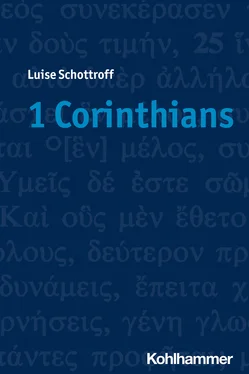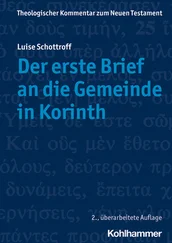1 ...6 7 8 10 11 12 ...25 A second, fundamentally different interpretive pattern arose primarily among liberation theologies. Here the relevance of future expectations for the present is emphasized, and time is interpreted as time in relation to God. The statement that »the reign of God has drawn near« in this case speaks of God’s nearness in the present, from which hope for the future emerges. 47This concept incorporates into the interpretation the life situation of the people who have their say in the biblical texts. For 1 Corinthians that means that the life situation of Paul and his addressees in the Roman Empire is to be taken into account. Here people who long for an end of violence in their daily lives wait for the revelation of the Messiah (1:7).
In summary, it can be said of Paul’s eschatology that it is an interpretation of the present out of one’s relationship to God.
1:7–8Gifts given by the Spirit and public testimony to the Messiah also maintain their strength through the expectation that the Messiah will come, in order to put an end to the power of the forces hostile to God (1:8; cf. 15:24). The congregation is strengthened by Christ (or God) on the difficult path through their social reality, so that the believers gain the ability to live in accord with the Torah (see on 7:19). 1 Corinthians often speaks of these difficulties, for example, the difficulties of belonging only to one God in a city that imposes on people a multiplicity of religious claims (Chapters 8–10). The believers’ deepening fellowship with the Messiah will protect them and preserve them in the face of accusations at God’s judgment. On judgment day the Messiah will see his work of strengthening the congregation reach its goal. They will not be charged, and thus the day of judgment will become the day of liberation. 48
1:9While Paul up to now has spoken about his prayer of thanksgiving (1:4), and thereby about the congregation and to the congregation, he here speaks a different language, that of consolation: he assures the congregation about God’s faithfulness, which they have already experienced in their fellowship with the Messiah. As von der Osten-Sacken rightly emphasizes, mutual love/ agapē as fulfillment of the law is the »paramount manifestation … of God’s faithfulness« 49and relates to the concrete relationships within the congregation. The continuation of the letter shows that as well.
10 I encourage you, sisters and brothers, to trust in the name of Jesus, our Messiah and Liberator, and to speak with one voice. Let no divisions arise between you, hold fast together in a common spirit and a common understanding. 11 Chloe’s slaves have reported to me about you, sisters and brothers, that there is conflict among you. 12 I mean by this that you all emphasize your differences: I belong to the Paul group, I to the Apollos group, I to the Cephas group, I to the Messiah group.13 Can Christ be divided? Has Paul, perhaps, been crucified on your behalf? Or were you immersed in the name of Paul? 14 I thank God that, apart from Chrispus and Gaius, I did not baptize any of you. 15 So no one can claim to be immersed in my name. 16 Actually, I did also baptize all the people in the household of Stephanus. But no one else, so far as I know. 17 The Messiah has not commissioned me to baptize but to spread the good news, and that not with eloquent human wisdom, so that the cross of Christ does not lose its power. 18 For to speak about the cross of Christ is considered foolish by those who are perishing. But it is saving us, because it is allowing God’s power to become a reality.
1:10There is strife in the congregation in Corinth. Paul speaks of divisions or dissention (1:10) and of quarrels (1:11). In 11:18 he returns to the divisions, and it becomes clear (11:22) that they arise from the way the well-to-do demean the poor at the Lord’s Supper. About the strife to which Paul refers in 1:10–18, the contours are less clear.
The extensive discussion about Paul’s »opponents« in Corinth has proven to be misleading. It operated with the concept of a group that advocated a theological point of view different from Paul’s. But in the letter itself, such a polar-opposite theological position and a thoroughgoing difference with Paul are not to be seen, but instead disputes over individual questions about proper and improper ways of living, over which there are differences of opinion within the congregation or even between Paul and the assembled congregation (5:1–13). The history of the interpretation of 1 Corinthians has been characterized by the hermeneutic assumption that this letter is battling »opponents« in Corinth. One has found therein polemics, condemnations, acrimony and irony. These assumptions rest on a pre -conception. In the interpretation that follows the text will be interpreted without this presupposition, in order to free the text from opposition to Paul’s opponents. The assumption of »opponents« rests on the battle line against heresy that orthodoxy drew up later in the history of the church. In that way, 1 Corinthians appeared to be the first document in the church’s defense of the true faith against deviants and Paul the father of the church’s orthodoxy.
Paul believes that the congregation’s divisions can be healed, for all invoke the name of Jesus and entrust themselves to him as Messiah and Liberator. Therefore, it should be possible to speak with one voice, so that the mindset and intention ( nous ), on the one hand, and the opinions and convictions, on the other, might once again agree.
1:11Paul says that he learned about the quarrels »from those of Chloe.« 50Chloe’s people could be slaves (cf. the genitive construction in Rom 16:10, 11), but it is also possible that Chloe serves as hostess to a group of women (cf. Acts 9:39; 1 Tim 5:16). All that is clear is the position this group takes on the issue. They are critical of the strife and know Paul to be on their side.
1:12There are people who separate themselves from one another. Paul exaggerates when he says that »each of you« is involved, for at least the Chloe group are not going along with it. Some align themselves with Paul, some Apollos and some Cephas/Peter. Others protest against the drawing up of boundaries in that they align themselves with Christ. When all is said and done, belonging to the Messiah is the entire congregation’s foundation. Those who belong to Christare presumably a group that rejects these in-group delineations. It can be seen in 3:3–4 that Paul regards these self-designations through which some, with the help of a particular preacher’s name, distinguish themselves from others, as a sign of arrogance that falls into line with the structures of this world. 51They ought to be overcome in the congregation. In 3:1–17 Paul presents his relationship with Apollos as an alternative to this perspective: God has assigned each of them his own particular task. There are no differences in rank between them. In 4:6 he says that he has used his relationship with Apollos as an example from which those in the congregation can learn. It is also seen in 4:6 that he regards orientation to the Torah as a basis for the overcoming of arrogance (»not to have a disregard for Scripture«). One can also refer to Jer 9:22–23 [Eng. Bible, 9:23–24] (cf. 1 Cor 1:31) for this: the alternative to an orientation to human wisdom, strength or prosperity is an orientation that comes from praising God. Thus, there is not a great deal that can be said about the conflicts in Corinth. We only have Paul’s view of them, as they can be discerned principally from 1:12; 3:3–4; 4:6. He regards these in-group delineationsto be destructive competitiveness(4:6). In God’s sight no one is more important than other brothers and sisters. Paul advocates the equality of all members of the body of Christ. Speculation about what issues or perspectives led people to connect with particular preachers (What’s on the Apollos-group’s agenda, etc.?) is pointless. Paul says nothing about this. He criticizes the in-group delineations as such. He is not interested in denouncing individual people or groups in the congregation but in giving visibility to competitive structures and criticizing them as destructive and as a product of a world marked by violence. 52How powerfully competitiveness and in-group delineations to the detriment of others underlie social order in the Hellenistic Roman world, Cicero makes clear in his praise of the behavior of boys: »How hotly they pursue their rivalries! how fierce their contests and competitions! what exultation they feel when they win, and what shame when they are beaten! How they dislike blame! how they covet praise! what toils do they not undergo to stand first among their companions! how good their memory is for those who have shown them kindness, and how eager they are to repay it!« 53This behavior is instilled in boys and where possible practiced by grown men. Women accommodate themselves to such structures, even if they do not usually actively adopt them. 54
Читать дальше












